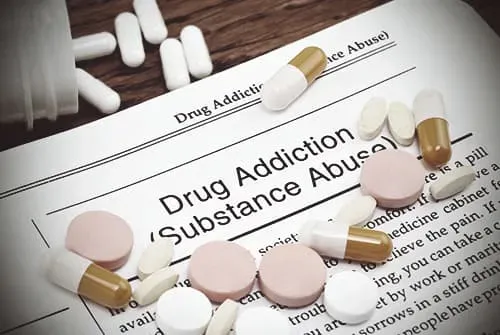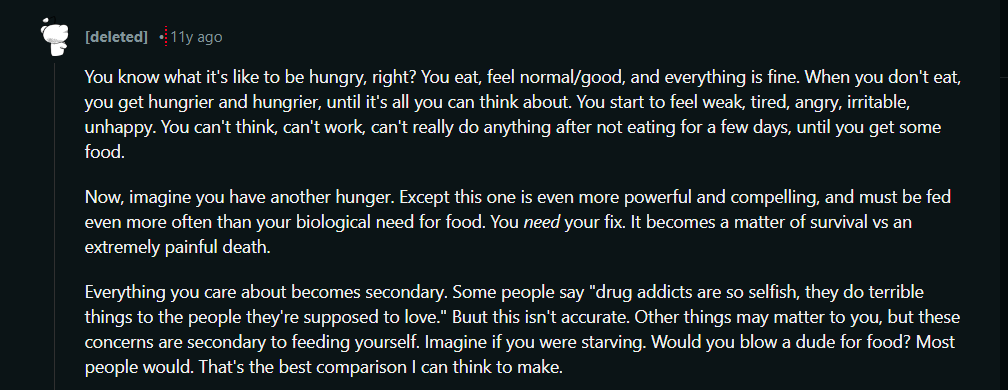Drug addiction, also known as substance use disorder, is a condition where a person finds it hard to control their use of legal or illegal drugs. Orange
County Drug & Alcohol Rehab Center offers one of the best drug addiction rehab centers in Orange County, CA. This chronic disease affects the brain and behavior. This makes it difficult for individuals to stop using drugs despite harmful consequences. The pull of addiction can override a person's decisions, leading to continuous drug-seeking behavior. Addiction changes the brain's structure and function. It impacts areas involved in reward, motivation, and memory. These changes support compulsive drug use and make the addiction cycle difficult to break. The shift in brain chemistry alters how people feel pleasure, leading to a reliance on the substance just to feel "normal."

In 2021, 61.2 million people aged 12 or older (21.9% of the population) used illicit drugs. Marijuana was the most commonly used, with 52.5 million users. Among young adults (18-25), nearly 40% used illicit drugs, and 33% used marijuana in the past year. About 7.7 million U.S. adults have co-occurring mental health and substance use disorders. Among adults with SUDs, 37.9% also have a mental illness. Drug overdose deaths have been rising, with 106,699 deaths reported in 2021. Synthetic opioids are a significant contributor to this increase, involved in nearly 88% of overdose deaths in 2021

This guy shared his experience being a meth addict years ago. He mentioned how life was so tough for him. He mentioned how prison has opened his eyes. Today, he has completely changed his life. This disorder isn't just about the physical dependence on a drug. It profoundly affects a persons behavior. Those who struggle with it often face challenges in their personal and professional lives. This leads to strained relationships and job difficulties. Recognizing its signs early and seeking treatment can help manage and overcome this disease. Paving the way for recovery and a healthier lifestyle.
What is Drug Addiction?
Addiction and substance use disorder often go hand-in-hand. Addiction is when a person cannot stop using a drug or alcohol, even if it causes harm. Substances like opioids, alcohol, cocaine are some of them. Others include nicotine, heroin, meth, marijuana and caffeine. Meanwhile, inhalants, cannabis, amphetamines, and barbiturates can also lead to addiction.
Addiction is characterized by:
- Compulsive drug seeking
- Continued use despite harm
- Changes in behavior
Substance use disorder is the clinical term used by professionals. It describes patterns of symptoms resulting from substance use.
Is Drug Addiction a Disease?
Yes, drug addiction is classified as a chronic disease. It involves changes in the brain's reward, memory, and self-control circuits.
Key points include:
- Brain changes: Drug use alters brain circuits involved in reward and self-control.
- Chronic nature: Addiction is long-lasting and can lead to relapse.
- Impact on behavior: These brain changes affect judgment and behavior, making it hard to quit.
The disease model recognizes that addiction is not a moral failing but a medical condition needing treatment. These brain changes can linger long after someone stops using drugs, making recovery a lifelong process.
What are the Types of Drug Addiction?
Drug addiction has two main types: chemical addiction and behavioral addiction.
Chemical Addiction involves the use of substances that alter the brain's chemistry. Commonly abused substances include:
- Alcohol: Often leads to dependence and serious health issues.
- Opioids: Includes prescription painkillers like oxycodone and illegal drugs like heroin.
- Stimulants: Includes cocaine and methamphetamine.
- Depressants: Includes benzodiazepines and barbiturates.
Behavioral Addiction is when a person is addicted to activities rather than substances. Common examples:
- Gambling: Compulsive gambling can ruin finances and relationships.
- Internet or Gaming: Excessive use of the internet or video games can disrupt daily life.
- Shopping: Compulsive buying can lead to financial problems and emotional distress.
These addictions often share similar features like loss of control, cravings, and the impact on daily life. They can coexist and interact, making treatment even more complex. Seeking help from a medical professional is crucial for both types. The right treatment can vary widely depending on the specific addiction and the individual's needs.
What are the Causes of Drug Addiction?
Drug addiction can be caused by a combination of genetic and environmental factors. It could also be due to behavioral and psychological triggers. These factors work together to influence a person's likelihood of developing an addiction.
Genetic and Environmental Factors
Genes can play a significant role in drug addiction. Some people have a genetic predisposition that increases their risk of addiction. For example, certain genes affect how a person responds to drugs, making them more susceptible to addiction.
Environmental factors also contribute to drug addiction. A person's family environment can impact their likelihood of using drugs. Peer pressure from friends who use drugs is another influencing factor. Moreover, living in a stressful or unstable environment can increase the risk of drug use.
Behavioral and Psychological Triggers
Behavioral triggers, such as engaging in risky behaviors, can lead to drug addiction. People who use drugs to cope with life challenges are more likely to develop an addiction. This includes using drugs to deal with stress, anxiety, depression, or anger.
Psychological triggers also play a role. Individuals with underlying mental disorders are at higher risk of developing an addiction. These mental disorders can include depression, anxiety, and other mood disorders. The presence of these conditions can make it difficult for a person to resist the urge to use drugs,. Even when they are aware of the harmful consequences.
What are the Symptoms of Drug Addiction?
Symptoms of drug addiction include physical and emotional changes. Behavioral changes can also indicate the presence of an addiction problem.
How to Recognize Drug Addiction Symptoms?
Drug addiction symptoms often start with tolerance, where the individual needs more of the substance to feel the same effects. Dependence follows it. This is where stopping the drug leads to withdrawal symptoms like nausea, sweating, and anxiety.
Compulsive drug-seeking behavior is another sign. This includes spending large amounts of time and resources to acquire the drug. Cravings for the substance can be intense and overwhelming. Social and professional life may suffer. The person prioritizes drug use over daily responsibilities. This can result in relapse, even after attempts to quit.
Diagnostic Criteria
- Increased tolerance – needing more of the drug for the same effect.
- Withdrawal symptoms – experiencing physical and mental distress when not using the drug.
- Unsuccessful attempts to quit – repeated efforts to stop using the drug have failed.
- Compulsive use – persistent use despite problems caused by the drug.
These criteria help healthcare professionals identify and treat drug addiction effectively. Meeting several of these points suggests a high likelihood of addiction.
What are the Effects of Drug Addiction?
Drug addiction affects both the mind and body, leading to numerous health conditions and altering behaviors. Additionally, it creates troubling social and economic issues. These can impact individuals, families, and communities.
Physical and Mental Health Effects of Drug Addiction
Drug addiction can severely harm physical health. It increases the risk of heart disease, HIV, and hepatitis B and C. Users might experience frequent illnesses due to a weakened immune system. Continued drug use can also lead to overdose, sometimes resulting in death.
Mental health conditions often accompany addiction. These include depression, anxiety, and psychosis. Drugs affect brain chemistry, reducing self-control and increasing compulsive behaviors. This change makes it difficult for people to stop using drugs, even when they want to.
Social and Economic Consequences of Drug Addiction?
Addiction impacts social relationships. It can create tension between family and friends as trust is broken and conflicts arise. People struggling with addiction may face problems at school or work, leading to poor performance or job loss.
Economically, addiction can be a huge burden. Individuals might spend large amounts of money on their drug habits, leading to financial instability. Health care providers often face increased costs due to treating drug-related health issues. This includes emergency room visits and long-term care for chronic conditions caused by drug use. In some cases, legal troubles arise from the use of illegal drugs, adding to the economic strain.
What are the Types of Addictive Substances?
Alcohol: A legal substance often found in beverages like beer, wine, and spirits. It can lead to dependency and various health issues.
Opioids: These include prescription painkillers like oxycodone and illegal drugs like heroin. They are highly addictive and often lead to serious health risks.
Cocaine: A powerful stimulant that can cause severe physical and mental health problems. It's usually snorted, smoked, or injected.
Nicotine: Found in tobacco products such as cigarettes and vapes. Habitual use can lead to addiction and long-term health complications.
Heroin: An illegal opioid made from morphine. It's typically injected, snorted, or smoked, leading to intense dependency.
Methamphetamine (Meth): A highly addictive stimulant that affects the central nervous system. It can be smoked, snorted, injected, or taken orally.
Marijuana: Also known as cannabis, this drug is commonly smoked or ingested. It can result in substance use disorder for some individuals.
Caffeine: Found in coffee, tea, and many energy drinks. While usually less harmful, excessive use can lead to addiction and health issues.
Inhalants: These are substances like glue, paint thinners, and aerosols that are inhaled to get high. They are especially dangerous and can cause sudden death.
Amphetamines: Stimulants often prescribed for conditions like ADHD. Illegal use can lead to serious addiction and health problems.
Barbiturates: These are sedatives that can be prescribed for anxiety or sleep disorders. Misuse can quickly lead to dependency and overdose risks.
What does Drug Addiction Feel Like?

This guy from reddit explains what being a drug addict feels like. He mentions how similar it is to being hungry. How being deprived of it makes you weak and angry. People experience intense urges to take the drug, even if they know the risks. These urges can become so strong that they overshadow other thoughts and actions. Emotional changes are common. They might feel anxious, irritable, or depressed when not using the drug. These emotional swings can make daily life very challenging.
The brain undergoes changes that affect self-control. This makes it hard for individuals to resist the temptation to use, no matter how much they want to stop. It can feel as if they have lost control over their own decisions.
Physical symptoms are also part of the experience. They might feel a need to use more of the drug over time to get the same effect, a condition known as tolerance. Withdrawal symptoms, like nausea, sweating, and shaking, can occur when trying to quit.
Drug addiction impacts the pleasure systems in the brain. Activities that once brought joy, such as eating good food or spending time with friends, may no longer feel satisfying.
Social relationships often suffer. The person's focus on drug use can lead to neglect of family and friends, causing feelings of isolation and loneliness. Living with drug addiction can create a sense of
helplessness. People may feel trapped by their dependency, finding it difficult to see a way out.
Russell Brand’s Experience Being a Drug Addict

Russell’s Background and Story
Russell Brand shares his experience of being a drug addict. He notes that there are many varieties of addiction and each person's story is unique. Brand's addiction story began in adolescence, during a period of transition and emotional upheaval. He describes his early experimentation with drugs as fulfilling an emotional and spiritual need. This leads to an escalating dependency. Initially starting with marijuana and alcohol, Brand quickly progressed to more serious substances. Substances like LSD, ecstasy, amphetamines, cocaine, and ultimately heroin and crack.
Brand recounts several anecdotes illustrating his addiction's impact on his life. Such as the humiliating experience of auditioning for a commercial while under the influence. His addiction worsened when he began using heroin and crack regularly. It lead to a rapid deterioration in his physical and mental health. The peak of his addiction involved frequent arrests, physical injuries, and a life dominated by the pursuit and use of drugs.
How He Achieved Recovery
Brand describes addiction as a strategy for survival, managing his emotional state through drug use. He emphasizes that by the time an addict realizes the consequences of their actions, they are often dependent on the substances. He highlights the difficulty of overcoming addiction. He cites the example of Vietnam veterans who struggled with opiate addiction after returning home. Despite the challenging circumstances, Brand achieved recovery through an abstinence-based program. He focused on not drinking or using drugs one day at a time.
He mentions the importance of knowing the underlying behaviors and emotional issues that led to his addiction. Brand's recovery involved working on issues related to food and sexuality. It also involved self-obsession, despair, disconnection, and low self-esteem. By facing these problems head-on and seeking solutions beyond drugs, Brand was able to maintain his sobriety. He has also improved his overall well-being.
How He Is Doing Today
Today, Russell Brand is many years clean and sober. He has achieved long-term recovery through a disciplined approach to managing his addiction. He continues to work on the behaviors and emotional issues that contributed to his addiction. This ensures that he maintains a healthy and balanced life.
